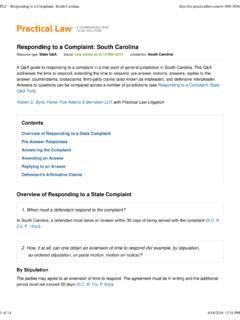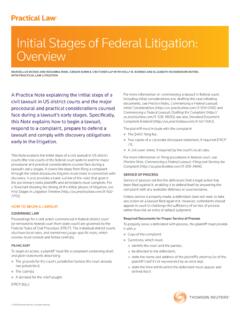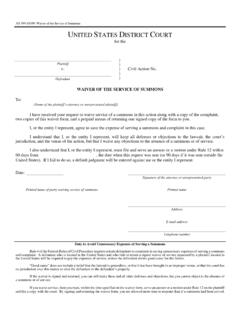Transcription of SERVICE in a CIVIL CASE: Frequently Asked Questions, CVC20h
1 Law Library Resource Center SERVICE in a CIVIL CASE: Frequently Asked Questions 1. What is a summons ? A summons is a court order that gives the defendant notice that a lawsuit has been filed against him or her. It also explains that a judgment will be made against him or her if the defendant does not answer the complaint within a specified number of days. When you file your CIVIL Complaint documents, the Clerk of Superior Court will issue a summons to each Defendant named in the complaint. 2. What is SERVICE of Process ? The delivery of your summons and Complaint to the Defendant you are suing is called " SERVICE of process." After you file your Complaint and the Clerk issues the summons , a copy of the summons , CIVIL Complaint, and certificate regarding compulsory arbitration must be served on each Defendant.
2 SERVICE of Process notifies the Defendant that a lawsuit against him or her is filed, which may affect his or her rights, and the Defendant has a right to speak and defend him or herself. 3. What does it mean to Serve papers ? Serving papers on the Defendant is an official handing over of your summons and Complaint to the Defendant. Papers must be "served" on any other person who is involved in the lawsuit or anyone the law requires to be served. SERVICE of court papers informs the Defendant what you are suing for, what you are asking the court to do, and that Defendant has a right to defend against the Complaint. A person is served when they officially receive the court papers.
3 4. What if I hire a Certified Process Server who is unsuccessful with serving the Defendant? If the certified process server attempts to serve the Defendant multiple times with no success, you must further research the location of the Defendant. See the last page of these FAQs for various ways you may research the Defendant s location. If, after diligently exhausting ways to locate the Defendant, you still cannot locate the Defendant, you may research the rules for SERVICE by publication. See Arizona Rules of CIVIL Procedure, Rule (l) and (f). If you have complied with this rule, you may serve by the method of publication.
4 5. Are there different kinds of SERVICE ? Yes. However, to begin a CIVIL lawsuit, Personal SERVICE is generally required. If you have a complicated case, or your case involves a Defendant from outside Arizona, ask an attorney for assistance in interpreting the rules and kind of SERVICE that best fits your case. Superior Court of Arizona in Maricopa County CVC20h 100317 ALL RIGHTS RESERVED Page 1 of 5 Personal SERVICE when the Sheriff, Constable, or Certified Process Server hand delivers the Complaint and summons to the Defendant, or to a person of suitable age and discretion who lives with Defendant. The Sheriff, Constable or Process Server must tell the other person that these are legal papers, then leave the papers near the person (at their feet is fine), or by leaving the papers at the Defendant s dwelling with a person of suitable age and discretion who lives there.
5 The person they serve does not have to accept the papers, or say, or sign anything. ARCP (d), (b). Publication - After you follow the list of ways to locate the Defendant (in #11 below), and you still cannot find the Defendant, you may request (by motion) an order from the court allowing you to use this type of SERVICE . You motion must convince the court by describing all your past unsuccessful attempts to serve the Defendant, that you have a valid claim against the Defendant, and that the Defendant you are trying to serve is necessary to the case. Only with the Court s permission, may you serve the Defendant by publication. ARCP (l), (f). Alternative SERVICE (Court permission required).
6 After you attempt to locate the Defendant (See list in #9 below), and you still cannot find the Defendant, you may request (by motion) an order from the court allowing you to use this type of SERVICE . With Court permission, you then may give the court papers to the Sheriff, Constable, or Process Server who serves process on the Defendant by leaving the court papers with someone other than a party to the lawsuit. ARCP (k). Also, you must mail the summons and the Complaint and the Court order authorizing alternative SERVICE to Defendant s last known business or residence.
7 Note: If you have a complicated case, or your case involves a Defendant from outside Arizona, ask an attorney for assistance in interpreting the rules and means of SERVICE that best fits your case. 6. Who can serve the court papers in a CIVIL Case? The Arizona Rules of CIVIL Procedure Rules 4(d) state that the people listed below may affect SERVICE within Arizona. These persons must not be involved in the case and must swear to the date, and method of delivery of the court papers. The county Sheriff, or Sheriff s deputy, The county Constable, or Constable s deputy A Certified Private Process Server YOU CANNOT SERVE YOUR OWN DOCUMENTS!
8 7. Does it cost money to serve the CIVIL Complaint and summons ? YES. The county sheriff, constable, or certified process servers charge for serving the CIVIL Complaint. The charges vary, so ask questions about the cost before you file at the court or hire a process server. 8. What if I cannot afford to pay a process server? If you cannot pay a process server to serve your CIVIL Complaint, ask for a Fee Deferral/Waiver packet at the Law Library Resource Center. The last form in the Fee packet involves SERVICE of process. Complete this form, especially noting the Defendant s exact address on the last page. Fill out the remainder of the form if you are also request a Fee Deferral or Waiver.
9 Deliver this Fee packet to the clerk of court at the same time you file your CIVIL Complaint packet. Superior Court of Arizona in Maricopa County CVC20h 100317 ALL RIGHTS RESERVED Page 2 of 5 9. When do I serve the CIVIL Complaint and summons ? Generally, after the Plaintiff files the CIVIL Complaint and summons forms at the office of the Clerk of Court, the Plaintiff coordinates the Sheriff or Process Server to serve the Defendant. Once the Clerk of Court certifies the summons and CIVIL Complaint, and hands it back to the Plaintiff, you may give the Complaint and summons to the Sheriff or Process server for SERVICE on the Defendant.
10 10. How long do I have to serve the Defendant? Generally, your summons and Complaint must be served within 90 days after you file the Complaint. (ARCP 4(i)) If you fail to serve the Defendants within 90 days, your Complaint will be dismissed. In complicated cases such as serving a Defendant in a foreign country, ask an attorney for assistance in interpreting the rules, and the kind of SERVICE that best fits your case. 11. Who must be served? All Defendants named in your Complaint must be served. The Defendants who are not served within the required time limit may be dismissed from your lawsuit. If your case involves a Defendant from outside Arizona, or outside the , or other particular situation, ask an attorney for assistance in interpreting the rules and kind of SERVICE that best fits your case.

















